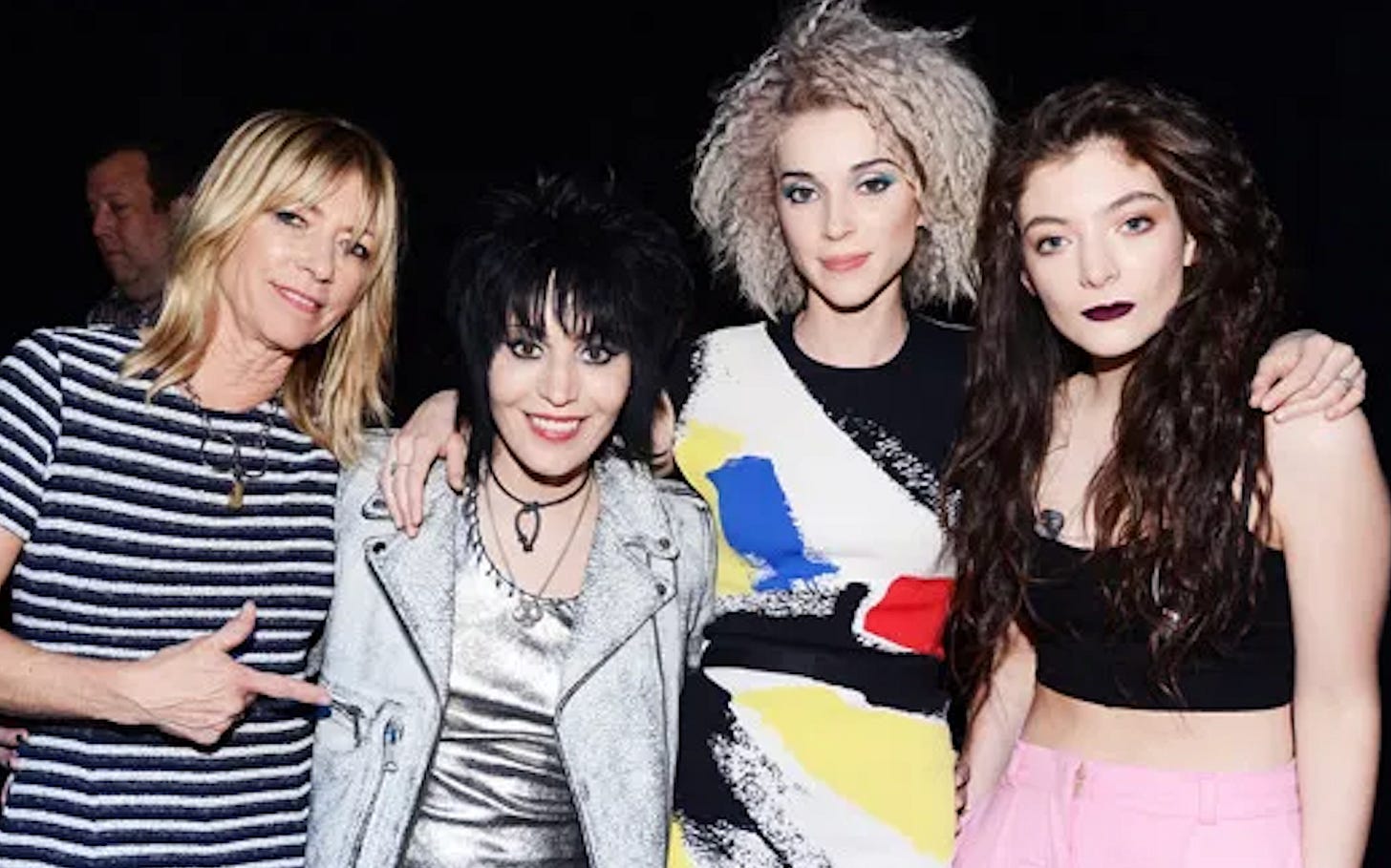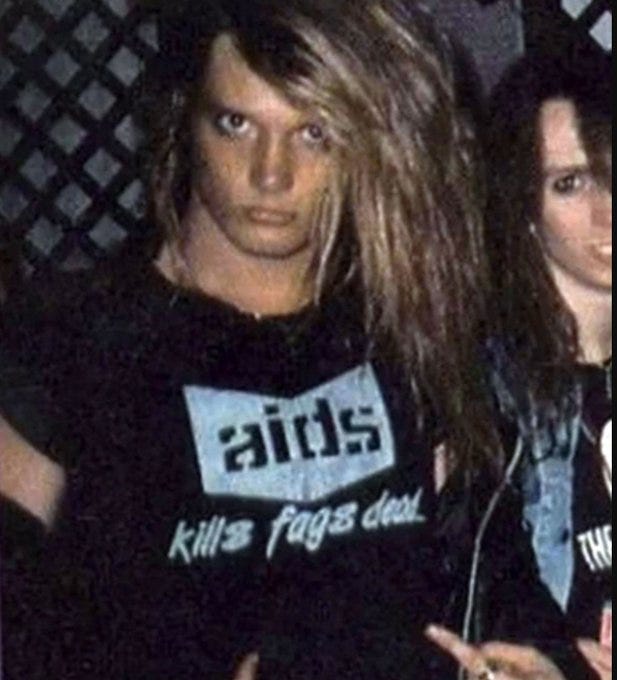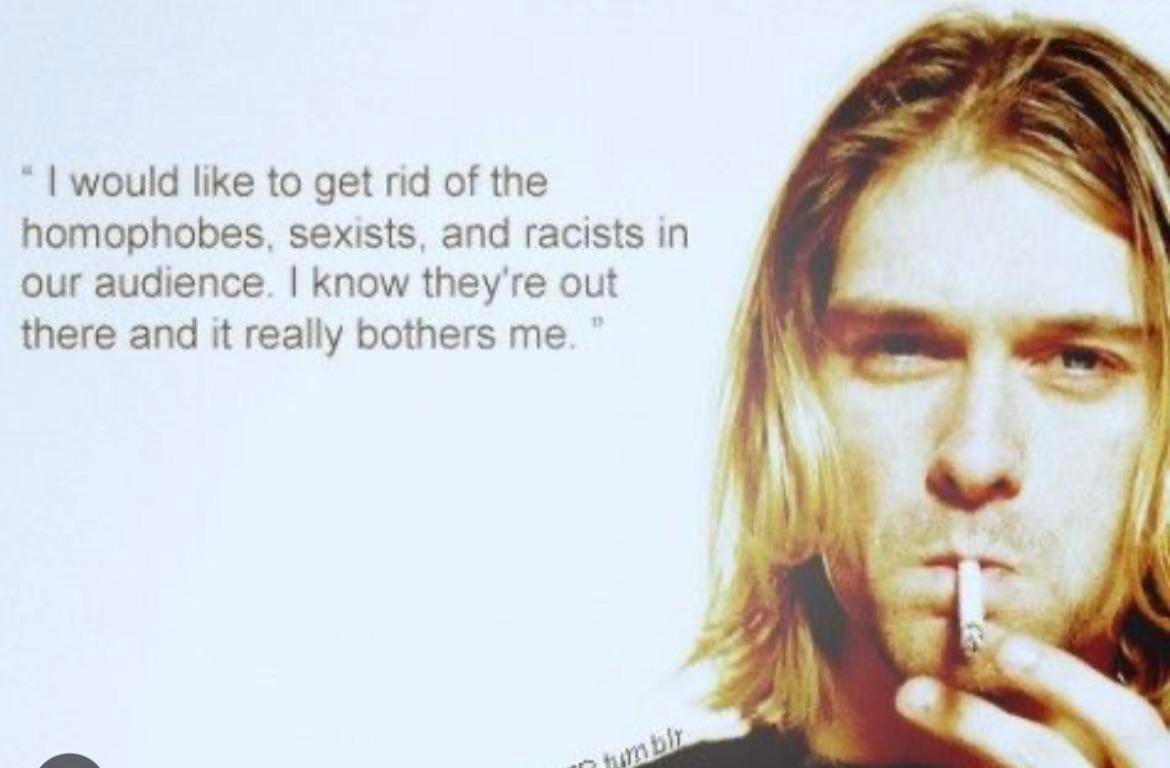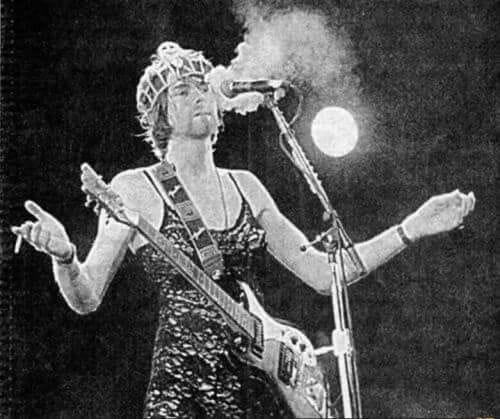Kurt Cobain spent his career teaching men how to be queer allies and feminists.
Because grunge’s origins are in punk rock and heavy metal, record companies often marketed the genre to the disenfranchised straight white male. But it was a different crowd in the spotlight when Nirvana was inducted into the Rock Hall of Fame in 2014. Dave Grohl and Krist Novoselic took the stage to perform the band’s biggest hits. Then a succession of queer and women artists — Joan Jett, Kim Gordon, St. Vincent, and Lorde — lovingly performed their own tributes to the band once led by the late Kurt Cobain. Michael Stipe of R.E.M. was given the honor of formally inducting the band into their rightful place in history.
Nirvana’s choice to be anointed into the Hall of Fame by women and queer musicians was a pointed reminder of how deeply connected the movement actually was to feminism and gay rights. Kurt Cobain’s legacy as the genre’s most important voice endures not just for the brilliance of albums like Bleach, Nevermind, and In Utero, but also for the way he taught men to channel anger into allyship.
Before Nirvana hit it big with "Smells Like Teen Spirit" in 1991, the male rock star was epitomized by the likes of Guns N' Roses' Axl Rose. Hair metal, also called glam metal, developed in the early 1980s in Los Angeles, on the hedonistic Sunset Strip, with leading groups like Mötley Crüe, Van Halen, Poison, and Skid Row. Their fashion borrowed from the androgyny of glam-rock icons like David Bowie and Marc Bolan, but the music of hair metal catered to heterosexual male desire. Scantily clad women appeared in music videos, seeming to exist only to fulfill the sexual fantasies of the male rock star. Infamous examples include songs like “Girls Girls Girls,” in which Mötley Crüe singer Vince Neil sings about his favorite strip clubs across the globe, or Guns ‘N' Roses' “It’s So Easy,” where Axl Rose tells a woman to “turn around bitch, I got a use for you.” He follows that up with, “Besides you ain't got nothin' better to do.”
When asked about the misogyny of Mötley Crüe’s music, Neil told Vanity Fair, “We’re rock musicians. We treat girls like shit. That’s just the way it is.”
These bands were so proudly sexist and homophobic that Skid Row’s Sebastian Bach wore a T-shirt that read, "AIDS kills fags dead.”
While toxic masculinity ran wild in L.A., a new music scene was forming in the Pacific Northwest, and it would obliterate the prototypical “cock rock” star. Although grunge wasn’t officially recognized as a genre until 1987, the scene started as early as 1984 with Seattle bands like Green River, L7 and the Melvins. When Nirvana arrived in 1989 with their debut album, Bleach, grunge culture had crystallized.
NPR’s music critic Ann Powers noted, “Nirvana came out of a much different scene, more female-dominated. Riot grrrl—a subgenre of punk rock that focused on empowering girls to speak out on feminist topics such as reproductive rights and sexual violence—sprang from the same circles as Nirvana, and Cobain made friends with famous riot grrrls Tobi Vail and Kathleen Hanna, who inadvertently gave him the title idea for 'Smells Like Teen Spirit.' From the very beginning, he was aware of the gender issue.”

The success of Nirvana’s second album, Nevermind, cemented Cobain as the genre’s leading voice. And everything Cobain stood for was the antithesis of hair metal ideology.
At Cobain’s insistence, grunge made space for a different representation of masculinity — one that recognized women as equals, not objects. Nirvana’s songs “Polly” and “Rape Me” confronted male aggression and rape culture. Speaking to NME in 1991, Cobain said, “Rape is one of the most terrible crimes on earth. And it happens every few minutes. The problem with groups who deal with rape is that they try to educate women about how to defend themselves. What really needs to be done is teaching men not to rape.”
From Cobain’s example, other prominent grunge musicians decried violence against women, and some actively supported causes addressing it. After the 1993 rape and murder of Mia Zapata — a member of the local Seattle band the Gits — several women in the punk and grunge scenes founded the nonprofit collective Home Alive, which raised money by organizing concerts with bands including Nirvana, Pearl Jam, and Soundgarden. One of Nirvana’s final performances in Seattle was a benefit concert organized to fund a private investigator to help find Zapata’s killer.
Cobain’s outspoken commitment to feminism landed him in the midst of one of rock n roll’s biggest rivalries. As Nirvana’s star began rising in 1991, media outlets likened their sound to Guns ‘N’ Roses. Quick to distance himself from the ethos of hair-metal bands, Cobain bashed the band in interviews.
“We’re not your typical Guns ‘N’ Roses type of band that has absolutely nothing to say,” Cobain told Rolling Stone.
That didn’t stop Axl Rose from vying for Nirvana’s attention. Rose invited the band on tour — a request that was immediately denied. Butt hurt, Rose instead used concerts to slander Cobain and his wife, Courtney Love, calling them junkies. Cobain spoke to The Advocate in 1992 about the feud:
“When we played in Portland, some kid jumped onstage and said, ‘Hey, man, Guns ‘N' Roses plays awesome music, and Nirvana plays awesome music. Let's just get along and work things out, man!’ “I just couldn't help but say, ‘No, kid, you're really wrong. The guy is a fucking sexist and a racist and a homophobe, and you can't be on his side and be on our side. I'm sorry that I have to divide this up like this, but it's something you can't ignore.”
Cobain wrote the song “In Bloom” to send a message to fans who might’ve jumped onto the Nirvana bandwagon without first understanding what the band stood for politically. In the music video, the band at first looks like some clean-cut 1960s group that’s performing on a variety show with an Ed-Sullivan-type host. As the song progresses, though, band members change out of their conservative attire and don baby-doll dresses — before smashing the stage to smithereens.
He's the one
Who likes all our pretty songs
And he likes to sing along
And he likes to shoot his gun
But he knows not what it means
Knows not what it means
In addition to championing feminism, Cobain used his platform to defend the LGBTQ+ community. And he did it during an era when the media largely ignored gay and trans rights. In the wake of panic surrounding the AIDS epidemic, a public figure with legions of straight, male fans taking a stand was rare if not non-existent. Ever defiant, Cobain would often wear dresses in interviews and at concerts. Two notable instances are Nirvana’s appearance on the heavy-metal-themed MTV show, Headbanger’s Ball, and a live performance of "Dive" in 1992 when Cobain wore a low-cut, black, lace dress and a crown, while drummer Dave Grohl wore a black bra and backward baseball cap.
In 1992, Nirvana played a benefit concert protesting Oregon’s “No on 9,” a ballot initiative that sought to amend the state’s constitution to declare homosexuality as “abnormal, wrong, unnatural and perverse.” Within the liner notes of the compilation album Incesticide, released that same year, Nirvana issued a warning: “If any of you in any way hate homosexuals, people of different color, or women, please do this one favor for us — leave us the fuck alone! Don’t come to our shows and don’t buy our records.” The liner notes of the band’s next album, In Utero, reiterated that admonition: “If you’re a sexist, racist, homophobe or basically an asshole, don’t buy this CD. I don’t care if you like me, I hate you.”
Cobain spoke about his own queerness in an interview with The Advocate in 1993. “I'm definitely gay in spirit, and I probably could be bisexual. But I'm married, and I'm more attracted to Courtney than I ever have been toward a person, so there's no point in trying to sow my oats at this point. If I wouldn't have found Courtney, I probably would have carried on with a bisexual lifestyle.”
Cobain recalled struggling with his sexuality from a young age. He had a gay best friend who his mother forbade him to see. “My mother wouldn’t allow me to be friends with him anymore, because, um, well, she’s homophobic.” That led Cobain to often spray paint the phrase “God is Gay” on walls throughout his hometown of Aberdeen in Washington. That phrase would later pop up in the Nirvana song, “Stay Away.”
When his sister Kim came out as a lesbian, Cobain worried she would face discrimination within the family. Nirvana’s song “Been a Son” was described by Pitchfork's Jenn Pelly as "a comment on how patriarchy sees women as second-class citizens, on how it dictates what it thinks women should be." The song may have also been a commentary on how his father couldn’t accept Cobain’s sister for being gay.
She should have died when she was born
She should have worn the crown of thorns
She should have
Been a Son
When it came time for R.E.M. lead singer Michael Stipe to induct Nirvana into the Rock Hall of Fame, he had this to say about the band’s legacy: “Nirvana defined a moment, a movement for outsiders: for the fags; for the fat girls; for the broken toys; the shy nerds; the Goth kids from Tennessee and Kentucky; for the rockers and the awkward; for the fed-up; the too-smart kids and the bullied.”
Stipe’s speech illuminated the real legacy that sometimes gets eclipsed by the immense commercial success the band achieved. In a music scene dominated by sexism and machismo, Nirvana taught young men how to be better allies.
Did you catch last week’s issue?
No.26 - "Smalltown Boy" - Bronski Beat
Fame was a tool for this activist turned pop star to fight for the voiceless.












Thank you for this article. I was in Nashville during the Nirvana days and I know nothing at all about them or about Cobain. I've not gone looking because I assumed there was nothing there that would speak to me, just a bunch of head banging grungies singing about things I wouldn't care about. You've schooled me.
Wow, I was never a Skid Row fan but I didn't realize they were that awful